Certification and staff training – all you need to know
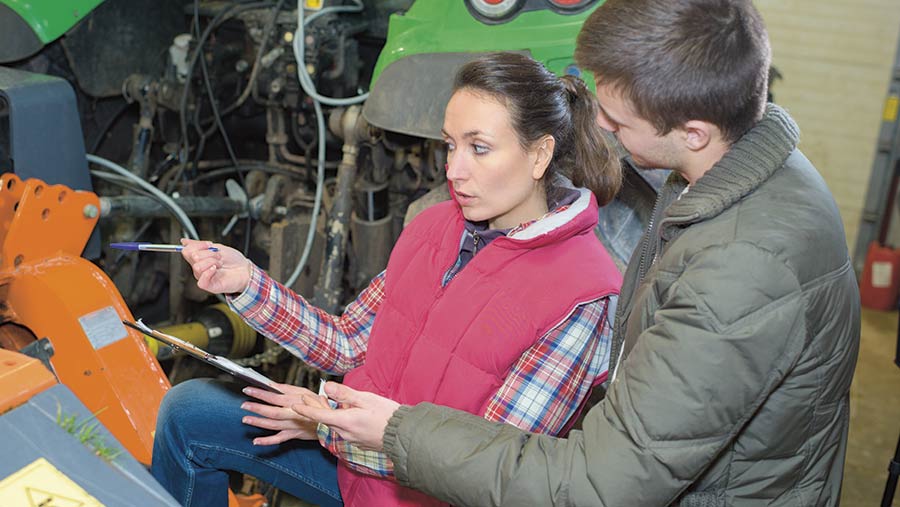 © Ing Image
© Ing Image With the average age of a farmworker now 57, agriculture is set for an injection of young blood over the next decade and training the youngsters to operate the large, gadget-clad machines in a safe manner will be more important than ever.
Unfortunately, there is no course that can offer 40 years’ experience and knowledge crammed into a week’s training, so educating new staff in the fundamentals of safe working is the first step.
There’s no excuse for having an untrained team operating machinery – the lives of employees and colleagues, let alone farm accreditation schemes and insurances, are all thrown into jeopardy.
See also: Health risks at work – how to stick to the rules
As an industry, agriculture lags way behind in safety. For instance, if you want to step foot on a building site in the UK, you will have to produce a construction skills certification scheme (CSCS) card
This confirms a basic level of knowledge and details the level of training you have achieved.
In 2016-17, the Health and Safety Executive (HSE) reported the fatal accident rate per 100,000 workers in agriculture is 7.61, with construction down at 1.37.
This is proof, if it were needed, that farming needs to seriously up its game. And while not all the certificates below are a legal requirement, they are still a huge benefit, both to operator competence and safety.
Farmers Weekly spoke to Debbie Wedge at Chelmsford and West Essex training group and Dianne Quested of Mid Kent Training.
She took us through the main certificates and training for farmworkers and a rough guide on what employers should expect to pay.
Prices stated were correct at the time of going to press and will vary with different training providers.
The essentials
First aid
This could be the most important qualification you ever take and tooling a number of the team up with first aid knowledge is a great idea. Farmyards offer plenty of hazards and having employees who respond quickly and calmly to an accident is vital.
The courses are widely available across the country and cover everything from recovery position and CPR to dealing with chemical ingestion and stopping excessive bleeding. It’s a one-day course with refreshers needed every three years.
- Course length – 1 day
- Cost (training and test) – £75
Manual handling
For a majority of farmworkers, lifting and shifting objects by hand is a daily task, but knowing how to do this safely is critical to avoiding life-changing injuries and possibly a forced career change.
The course teaches you how to use your body to lift and move objects rather than relying on your back. Taken as a group of up to 10 people, the course is offered by a host of training providers, including Lantra and NPTC.
- Course length – half a day
- Cost – £65
General farmworker
Spraying – mandatory
Browse arable farmworker job adverts and you’ll see a PA1+2 licence crop up. Most farmers are now aware that, regardless of age, it is a legal requirement for volunteers, employed and self-employed people operating a sprayer commercially to have these qualifications – known as Pesticide Application (PA).
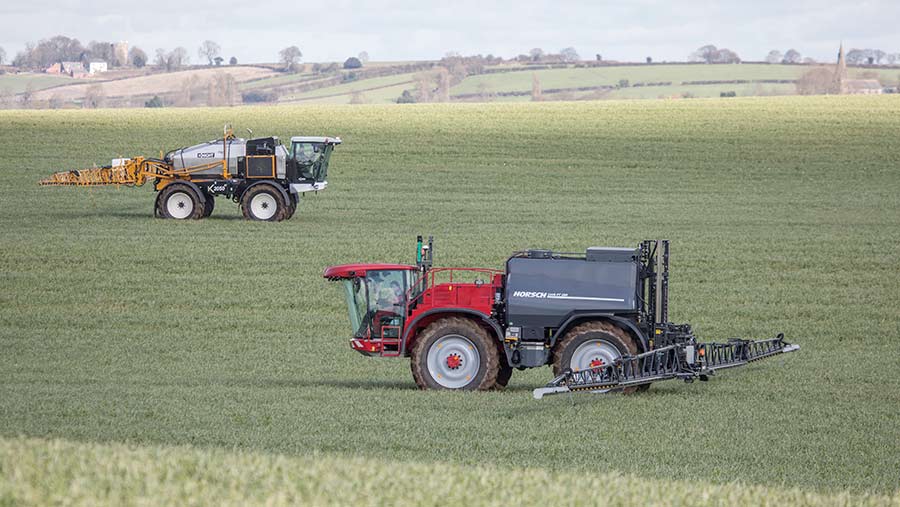
Spraying ‘grandfather rights’ have been scrapped
Previous entitlements, known as “grandfather rights”, that allowed older members of staff to operate sprayers without any formal training was scrapped in 2015.
The qualification is run by the National Proficiency Test Council (NPTC), which is now known as City and Guilds Land Based Services, and Lantra, and is classed as a licence to practice within agriculture.
PA1 – Basic module
This is a one- or two-day course – depending on experience – for anyone involved in the handling, use, transport and storage of pesticides and gives a sound grounding in pesticide legislation, why pesticides are used, how to best store them, record-keeping and safe use.
It’s purely classroom based, with a novice likely to need a bit of revision to pass. It’s compulsory and no further spraying qualification can be undertaken without mastering this first.
The multiple-choice test takes 60 minutes and contains 33 questions in seven sections. Candidates must achieve a minimum of one question in each section and a total of 24 correct answers.
- Course length – 1 day
- Cost (training and test) – £236
Practical tests
Once passed, PA1 is the key needed to undertake practical assessments, of which there are more than 12 to choose from, including fogging and aerial application.
The tests cover the full spraying process, from looking at the weather and deciding if it is safe to spray, measuring chemical quantities, operating the sprayer, record-keeping and safe storage of used cans.
Once qualified, users are encouraged to join the National Register of Sprayer Operators (NRoSO), which helps members expand their knowledge and contacts in the industry by attending training courses and shows. There are also advantages in being a member when complying with farm assurance schemes.
Each NPTC practical test will earn you eight points, with 30 to be collected over the three years. Membership costs £78 if paid for in one hit.
PA2 – Boom sprayer
For agricultural purposes, this is the most relevant and includes mini 6m booms attached to UTVs right up to the 8,000-litre, 40m-wide monsters on arable farms.
If you are a complete novice, it is handy to get a few hours under your belt sat in the cab beside a qualified driver to get a grasp of the filling and application techniques.
The examiner will want to see that you can manually calibrate the machine and spray confidently. The test will take place at your farm and you will need to supply a sprayer.
Ideally, if you can round up a few mates who need to complete the training as well, you’ll be trained and tested on your machine and you may save a few quid, too.
- Course length – 1 day
- Cost (training and test) – £300
PA4s – Slug pellet application
Many farms carry out this job in-house using an ATV and some even fit the applicator to the rolls or sprayer to avoid an extra pass – either way, the user has to be qualified.
The training has a strong focus on spreading around rivers and maximum dose rates, especially alongside footpaths, while knowledge of the product and calibrating the equipment correctly is also required.
There’s a separate license – PA4g – that covers granular products such as Avadex.
- Course length – Up to 1 day
- Cost (training and test) – £278
PA6 – Knapsack (separate modules for specific use areas). PA6aw allows you to apply pesticides near water.
Anyone spraying weeds around the yard with chemical through a knapsack and lance will need to have completed a PA6 qualification.
The training and test consist of both theory and practical elements, with the final exam being to spray a marked area without running out of chemical or overdosing. A world away from operating behind a cab with filtration system, the correct protective kit is essential to keep the user safe.
- Course length – 1 day
- Cost (training and test) – £258
Specialist tests such as PA8 – mixing pesticides in a bowser – are only required if the user doesn’t hold a PA1+2 qualification.
Forklift – mandatory
Forklifts are operated by everyone from harvest students to the boss and all drivers need to have received some documented formal training.
Lantra runs the test, which consists of a practical assessment running through maintenance of the machine to pallet fork and bucket work.
Refresher courses are needed every few years to keep the operator ahead of new rules that might be looming, such as the dull-sounding EN15000 legislation, which requires makers to fit cut-out systems to telehandlers when the machine nears its overload limit.
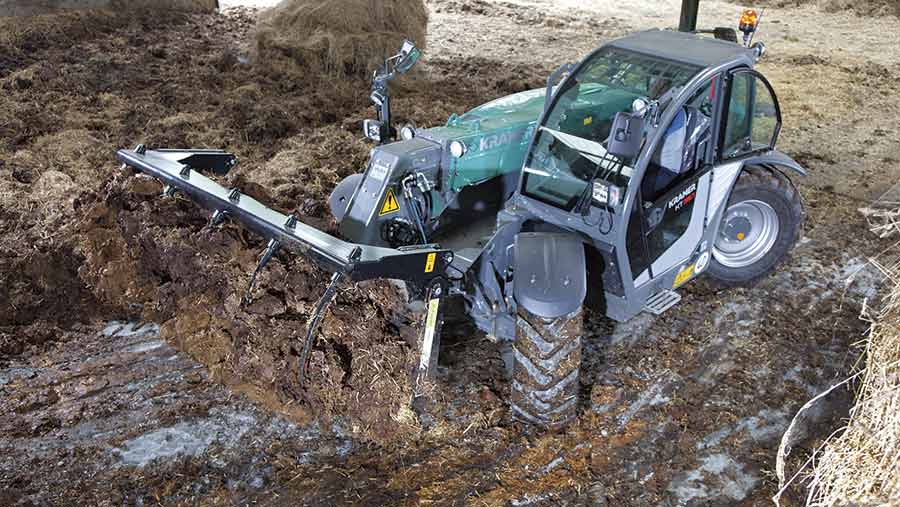
All forklift drivers need to complete documented formal training
All-terrain telescopic
A telehandler that can lift to 6m will be the most common licence for farmers, but there are further tests for machines that hoist to 9m and above.
- Course length – 1-5 days, depending on experience – includes training and test
- Cost (training and test) – £150/day
Mast
Handy for shifting boxes in a potato store or lifting implements around a workshop, these machines aren’t covered by the telescopic licence and required separate training.
- Course length – 1-5 days, depending on experience – includes training and test
- Cost (training and test) – £150/day
Tractor driving test – compulsory for 16-year-olds to drive on the road
The provisional F category on a driving licence is only required for employees who don’t hold a full driving licence or 16-year-olds who are a year shy of being able to take the full car test.
The DVLA exam takes place at an agreed location and once passed, allows tractors up to a width of 2.45m to be taken on the road for agricultural operations.
This restriction is in place until a car licence (category B) is passed. It’s worth checking if your insurance covers younger drivers on the road, too.
- Cost (DVLA test) – £62
Tracked machine (rubber tracked tractors) – compulsory
This only applies to twin-track crawlers, which slow one track and speed the other up to turns corners – for example, Fendt MT and John Deere RT machines. Articulated steering tractors such as Case Quadtracs aren’t included.
The category H test involves a DVLA examiner assessing the operator from the roadside rather than in the cab on stopping, turning and reversing manoeuvres. There is an eyesight, road sign and highway code question session at the end and you have to be 21 or older to sit the exam.
- Cost (DVLA test) – £62
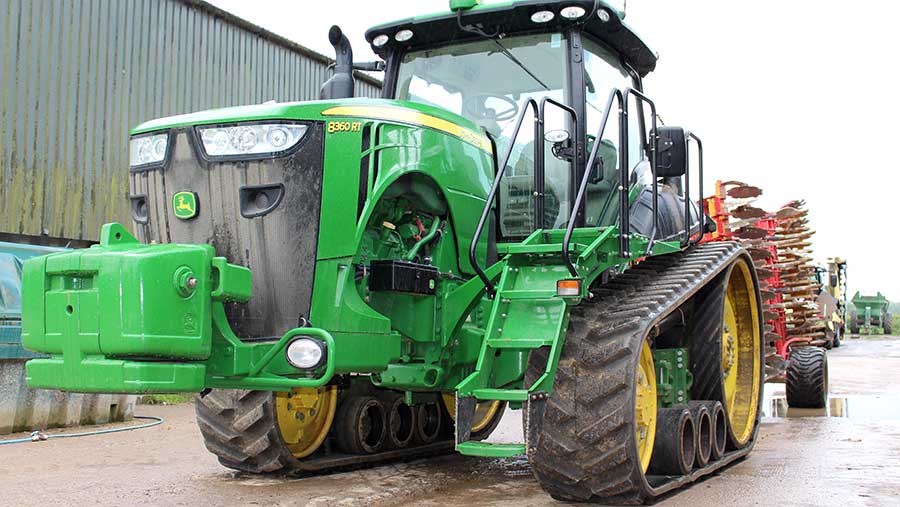
Only twin-track crawlers are covered
Estate worker
Chainsaw – mandatory
Winter time sees the arable work stop and the chainsaw comes out for those winter tree projects. A dangerous tool in the wrong hands, any training on how to use and maintain pieces of equipment is valuable and could prevent life-changing injuries.
While the general public can go and buy a chainsaw for personal use, anyone using a saw commercially needs to be licensed. Below are the courses offered by the NPTC and Lantra.
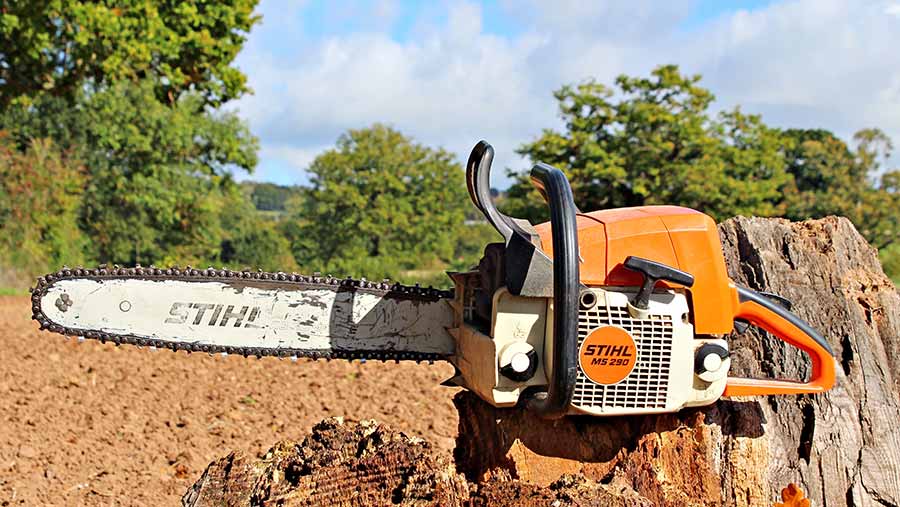
Chainsaw training is valuable to avoid accident
CS30 (002003) – Cross-cutting and maintenance
The basic module explains saw maintenance, chain sharpening and cutting timber on the floor in forest situations, with advice on the protective clothing and equipment needed.
- Course length – 2 days
- Cost (training and test) – £396
CS31 (002004) – Felling of trees up to 380mm diameter
Usually taken with CS30 and allows the operator to fell smaller trees, ideal for brush clearance and ditching works.
- Course length – 3 days
- Cost (training and test) –£480
CS32 (002101) – Felling of trees over 380mm diameter
Not overly common in agriculture, but if you have plenty of woodland or winter coppicing projects then it may be worth knowing how to fell larger trees and save money hiring in arboriculture contractors.
- Course length – 3 days
- Cost (training and test) – £640
Abrasive wheel (grinders) – mandatory
A common workshop tool, but most farmers are unaware that to be legal when operating and changing the wheel there is a one-day course.
- Course length – 1 day
- Cost (training and test) – £135
ATV – mandatory
No one younger than 16 is allowed on a quad bike, whether as passenger or driver. This isn’t a compulsory qualification, but does offer best-practice tips and also maintenance on the vehicle.
Sit in
This covers UTVs where the driver and passenger are sat side by side, often with a protective roll bar and a rear load bed.
Sit astride
The standard quad bike course teaches how to ride up and down slopes, on different terrains and any personal protective equipment (PPE) the operator needs.
- Course length – 1-2 days
- Cost (training and test) – £160/day
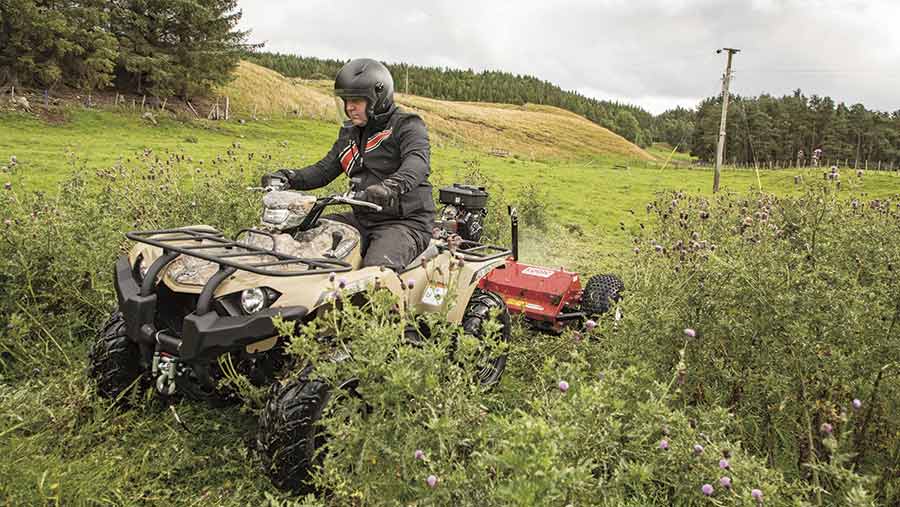
No one younger than 16 is allowed as a passenger or driver on a quad bike
360deg excavator – mandatory
To operate one of these on a building site, you will need to complete a nine-day course provided by training body CITB. The rules for operating one on a farm isn’t as strict, although it is wise to get some training, no matter how good you think you are.
The Lantra two-day course is led by an experienced 360deg operator and covers servicing and driving the machine, grading and trench digging, along with bucket swapping and working to site levels.
- Course length – 2 days
- Cost (training and test) – £340
Rodenticide – mandatory
To bait traps with commercial-grade rodenticide, a training course will have to be completed in accordance with 2016 legislation introduced by the HSE, along with the Campaign for Responsible Rodenticide Use (CRRU), which clamps down on the poisoning of non-target animals.
There are plenty of online courses that offer a few hours’ training and an exam and are approved by a few farm assurance schemes.
However, Lantra also runs courses and without any formal training farmers can’t buy commercial bags of rodenticide carrying the CRRU label.
For larger farms, there are benefits in using external contractors to bait large barns at fixed costs to keep inspectors happy. Anyone wanting to use phostoxin (gassing) to fumigate rabbit warrens requires further NPTC or Lantra level 2 certification.
- Training and test cost – £165
- Online course – £60
Agronomy
Basis
For budding agronomists, these two qualifications are essential in order to legally provide farmers with advice and recommendations for correct chemicals to spray on crops and fertilisers to soil, along with a host of other topics, including writing nutrient management plans.
The Basis certificate in crop protection is an industry standard for anyone selling agrochemicals or advising farmers on their use.
Training takes 35 days for a new entrant, either in week-long blocks or individual days. Candidates with experience would need less training.
The exam is split into four sections over two days – theory, practical, a 3,000-5,000-word project and field trails and interviews.
Facts
A Facts licence focuses on soil and water health, teaching how to recommended the correct fertilisers to increase yield and benefit soil. It takes six days in total – five days of training and an exam.
Prices will vary depending on the amount of training needed, which is based on the experience of the candidate.
As a guide, Basis will be £2,300 plus an exam fee of £402, while Facts is a bit cheaper at £900 and a £241 test cost.

